The Next Pope?
Farley Clinton
A Roman correspondent for conservative publications, not necessarily from a traditional perspective, nevertheless gives a good insight in this article on the behind the-scenes intrigue of the anticipated nomination of new cardinals and the election of Pope John Paul II's successor.
|
It is believed by those of us in Rome that sometime in mid-February, the Holy Father will name about 25 new cardinals who will be under 80 years of age and accordingly may be expected to vote on the choice of his successor. It may be useful to consider a few of the worst problems that will face the next pope, and a few of the bishops who are reportedly highly regarded among the cardinals who will vote.
|
- There has been a total failure to recruit new priests for 30 years. For example, there were no candidates in Dublin, Ireland, last year at all. In U.S. dioceses, such as that of Milwaukee, Wisconsin (USA), the same situation has been true for years.
- The pontificate of Pope Paul VI (1963-1978) plunged the Roman Catholic Church into chaos from which it has not recovered.
- The Jesuits have engaged in smoldering warfare with the last four popes. Pope John XXIII seemed ready to suppress them 40 years ago. They have been a major problem for Pope John Paul II throughout his reign.
- Dioceses worldwide are smothered with scandal. Homosexuality is a major problem, more or less, in religious orders.
These problems barely scratch the surface. Besides these concerns, analysts are bearing in mind the following considerations which will influence the choice of the conclave.
- Any pressure to elect another non-Italian pope is fading as non-Italian candidates are controversial or unpopular with the electing cardinals. No non-Italian has the merits of Cardinal Wojtyla, who was selected because of the strong chance he would destabilize Russia and the fact that he had a major role in writing the anti-birth control letter, Humanae Vitae, published by Pope Paul VI in 1968. Despite this, six names in particular keep coming up, all different than those bandied about just five or six years ago as being "papabile": three Italians, a Czech, an Austrian, and a Colombian (South America).
- The election conclave is likely to see a duel between Pope John Paul's powerful right hand, the Italian Archbishop Giovanni Battista Re, and Joseph Cardinal Ratzinger, who is disliked by the Roman Curia but admired by non-Italian cardinals.
- The new Catechism of the Catholic Church (published 1994) is highly unpopular with both left and right wings and embarrasses the Austrian candidate, Archbishop Christoph von Schonborn, who organized the writing of it.
- The most powerful man in Rome over the last decade, Archbishop Re, who is himself unpopular and the object of violent reactions, won't be elected, but might possibly maneuver to get his man elected. The new system (See Angelus Press Edition of SiSiNoNo, "The Next Conclave," No. l3) of voting will debut at this conclave, requiring only half the cardinals to agree on a candidate to be elected. But this of course opens the door to an even split, open "schism," if a man with half the votes is rejected by half, or nearly half, the cardinals.
- Child molestation can be linked to new post-Vatican II sex education programs which are object of strong protests. This outrage eliminates any candidate connected with authorship and publication of the program.
- The South American cardinals seem too divided to be of any use to a South American candidate, though the Colombian, Bishop Dario Castrillon Hoyos, might get the support of Cardinal Ratzinger.
- Pope John Paul II has told Archbishop Runcie that union of the Roman Catholic Church with that of the Church of England has for now been ruled out by Anglican insistence to ordain women. Ecumenism is said to be really given up by all Catholic bishops in England, even the most liberal, as no basis at all for union now exists.
- John Paul nearly died after his taxing trip to Georgia, which was scheduled to open doors for him into Moscow, but Russian hostility is stronger than ever and unlikely to change for another generation or so.
- On the whole, the Jubilee Year was a failure. Smaller crowds than expected converged for all events with the exception of the Youth Rally in Rome. This was judged a success due to enthusiastic new groups worldwide that have taken the place of dying organizations like the Jesuits.
- In the U.S., Catholic schools are deteriorating, and are effectively opposed now by the new approach of groups like Opus Dei.
- The China problem remains unsolved for the Vatican, with worsening problems in missionary countries. Inroads of the protestant sects have effected a major collapse of the Church in northern South America. Apostasy has resulted in an almost complete loss of France and Ireland, sparking demands of some for reform by rethinking the changes of the last 30 years.
- The huge personal popularity of our obviously unhealthy Pope seems related to his obvious skills and temperament of an actor, which are especially well-suited to lead and direct great crowds. This raises the question whether in these days a TV type pope is almost a necessity. If so, this would clearly favor the photogenic and tactful Colombian (Cardinal Hoyos) over everybody else.
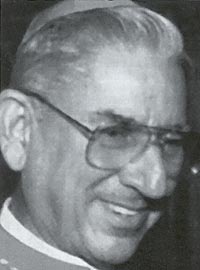 DARIO CASTRILLON HOYOS, born in Medellin, Colombia (1929), ordained priest (1952), consecrated bishop (1971). Bishop of Pereira, Colombia (1976); about 1,000,000 people, all Catholics (nominally), and about 175 priests. Archbishop of Bucaramanga, Colombia (1996); about 1,000,000 people, all Catholics (nominally), and about 200 priests. Called to the Vatican by Pope John Paul II to oversee the Congregation that deals with measures to promote holiness of priests and their intellectual adaptation to modern times. Made Cardinal (1998). Famous because he will go anywhere, speak to anyone; rioting peasants or Communists perhaps a specialty; all taken in stride without missing a beat. Obviously intelligent; tells people what they like to hear, without, it seems, violating Church doctrine. Unique among the cardinals and perhaps among all modern churchmen, he decided one day to look in on the press room and see the journalists who cover the Vatican at work. He said a few words to them. When he was finished, all the journalists stood up and cheered, an incident as inconsistent with the fundamental nature of the elements involved than the parting of the Red Sea. Recently he has been named to oversee the peaceful restoration of the old Tridentine Mass and the pacification of those infuriated when the Vatican replaced it. It seems to many that this will be his Waterloo; passion on both sides is very intense. It seems he may have been picked for this most ticklish assignment by the all-powerful Archbishop Giovanni Battista Re, chief adviser to Pope John Paul II, possibly so as to weaken and diminish Cardinal Hoyos lest he become a successful rival in the next conclave to Archbishop Re's supposed candidate, Bishop Dionigi Tettamanzi (of whom we speak soon). Looks considerably younger than his years. Lean, but–so far as his facial expression goes anyhow–not mean. People in Colombia are said to be less enthusiastic about him than people in other countries. Up close, in an office, in a normal working situation, he is said to not be formidably impressive, but just a nice, intelligent man. This is exactly the common opinion held about Karol Wojtyla during the ten years before he became the pope.
DARIO CASTRILLON HOYOS, born in Medellin, Colombia (1929), ordained priest (1952), consecrated bishop (1971). Bishop of Pereira, Colombia (1976); about 1,000,000 people, all Catholics (nominally), and about 175 priests. Archbishop of Bucaramanga, Colombia (1996); about 1,000,000 people, all Catholics (nominally), and about 200 priests. Called to the Vatican by Pope John Paul II to oversee the Congregation that deals with measures to promote holiness of priests and their intellectual adaptation to modern times. Made Cardinal (1998). Famous because he will go anywhere, speak to anyone; rioting peasants or Communists perhaps a specialty; all taken in stride without missing a beat. Obviously intelligent; tells people what they like to hear, without, it seems, violating Church doctrine. Unique among the cardinals and perhaps among all modern churchmen, he decided one day to look in on the press room and see the journalists who cover the Vatican at work. He said a few words to them. When he was finished, all the journalists stood up and cheered, an incident as inconsistent with the fundamental nature of the elements involved than the parting of the Red Sea. Recently he has been named to oversee the peaceful restoration of the old Tridentine Mass and the pacification of those infuriated when the Vatican replaced it. It seems to many that this will be his Waterloo; passion on both sides is very intense. It seems he may have been picked for this most ticklish assignment by the all-powerful Archbishop Giovanni Battista Re, chief adviser to Pope John Paul II, possibly so as to weaken and diminish Cardinal Hoyos lest he become a successful rival in the next conclave to Archbishop Re's supposed candidate, Bishop Dionigi Tettamanzi (of whom we speak soon). Looks considerably younger than his years. Lean, but–so far as his facial expression goes anyhow–not mean. People in Colombia are said to be less enthusiastic about him than people in other countries. Up close, in an office, in a normal working situation, he is said to not be formidably impressive, but just a nice, intelligent man. This is exactly the common opinion held about Karol Wojtyla during the ten years before he became the pope.
Knives are being sharpened now to cut down the prominent South Americans, especially Hoyos and another cardinal from Colombia, Lopez Trujillo, now working in the Curia, both of whom have considerable prestige. Cardinals Hoyos and Trujillo strike most people as the papal front-runners if there is any truth in the view that South America, with the largest concentration of Catholics on the planet, is the region from which the next pope ought to be chosen.
Cardinal Lopez Trujillo, by the way, was spoken of as a man destined to be pope when he was 35 years old. That was 30 years ago. He comes from a decidedly prominent family in Colombia, and he was already general secretary for the most important organization of bishops in the world, the South American conference.
In the Republic of Colombia, standards of education and of general culture are admittedly a good deal higher than in almost any other part of Latin America, and many seem to think that the best educated churchmen of Colombia are fully the equals of any European churchmen–as well prepared as anyone to confront all the problems of the Church. "Venezuela is the barracks, Colombia is the university, and Ecuador is the seminary," says a proverb in that region. That is to say, Venezuela is the nation of soldiers, Colombia is the paradise of intellectuals and of high culture, and Ecuador is the land of pious priests and laity.
The omnipotence of the Left, however, in the press of the Western world, will surely exclude both of the cardinals from Colombia. I know the sort of men who wind up writing about the Church, and I know pretty well what they are likely to write about the conclave and their election. It doesn't matter too much what really goes on. The same kind of things are going to be said, in the same tone of voice. Castrillon Hoyos or Lopez Trujillo will most undoubtedly be denounced hysterically, as conspirators deeply involved with "fascist" governments in Colombia. In any case, the readiness of the liberal journalists to denounce anybody and everybody as "fascist" or "anti-Semitic," together with their total ignorance of history, their great gullibility, and, in a few cases, the almost complete lack of what is called the critical faculty, portends the election of an Italian at the death of Pope John Paul II.
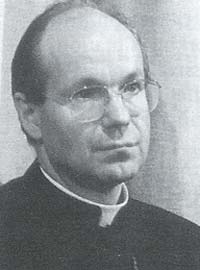 COUNT CHRISTOPH VON SCHONBORN, born Czechoslovakia (1945), ordained priest (1970). Archbishop of Vienna; extremely young to be a papal candidate. To those who knew him as a young Dominican priest, prior to his rise to greatness five years ago, he seemed a serious but pleasant, a spiritually-minded but delightfully human person. A few carping voices insist we should not forget that, however agreeable and well-bred, the Count was not intellectually well prepared for the delicate task assigned him to organize an orthodox, quasi-official, catechism that in 1985 Rome resolved to bring o ut. It was felt that something of the sort was obviously needed to contradict, discredit, and replace a huge flood of catechisms, prepared originally by Jesuits in Germany, Holland, Belgium and France in the 1950's. On close inspection these turned out to be far, far more Protestant than Catholic in tone and content. There was hell's own amount of trouble over preparing a new catechism that had no reason to exist except, indirectly, and blandly and suavely, to condemn liberal Catholicism. In brief, the huge, and not exactly readable, book Schonborn turned out has reportedly made enemies of its more serious readers, so that now this ecclesiastic is distrusted by both conservatives and liberals.
COUNT CHRISTOPH VON SCHONBORN, born Czechoslovakia (1945), ordained priest (1970). Archbishop of Vienna; extremely young to be a papal candidate. To those who knew him as a young Dominican priest, prior to his rise to greatness five years ago, he seemed a serious but pleasant, a spiritually-minded but delightfully human person. A few carping voices insist we should not forget that, however agreeable and well-bred, the Count was not intellectually well prepared for the delicate task assigned him to organize an orthodox, quasi-official, catechism that in 1985 Rome resolved to bring o ut. It was felt that something of the sort was obviously needed to contradict, discredit, and replace a huge flood of catechisms, prepared originally by Jesuits in Germany, Holland, Belgium and France in the 1950's. On close inspection these turned out to be far, far more Protestant than Catholic in tone and content. There was hell's own amount of trouble over preparing a new catechism that had no reason to exist except, indirectly, and blandly and suavely, to condemn liberal Catholicism. In brief, the huge, and not exactly readable, book Schonborn turned out has reportedly made enemies of its more serious readers, so that now this ecclesiastic is distrusted by both conservatives and liberals.
The liberals are secretly furious because Schonborn's catechism turned out to be, if anything, more solemn and official in its unequivocal condemnation of all artificial birth control than the encyclicals Casti Connubii [Pope Pius XI (1930), available from Angelus Press] and Humanae Vitae. They were dismayed that he did not tone down his hand-slapping of modern theology, even though the condemnation is only implied by an aggressive treatment of the traditional belief in original sin. The liberal bishops cannot complain openly, but they hate this new Catechism of the Catholic Church for the orthodoxy which it sometimes shows. This is bound to make a difference in sophisticated theological circles concerning Cardinal Schonborn.
Schonborn's enormous book is said to be really offensive, though for different reasons, to more or less everyone in the higher levels of the Church. Conservatives don't like the tone of it because more than half this "catechism" turned out to be just a collection of editorials, written from a strong left-wing point of view. Some occasional restatements of old orthodoxy are found, as we have seen–and exactly where they are least wanted in the U.S. or Paris–but these echoes of medieval faith are incongruously floating about in a flood of sugary and watery verbiage. Conservatives find that the Catholic parts of the book are like a dinner lying under three million tons of lemon-colored jello. Malcontents, therefore, raise the question of this cardinal's intellectual qualifications to produce a monumental catechism or any serious work whatever. They will tell you that the man had never produced anything serious or interesting prior to going to work on this project, and you are led to conclude that nothing ever changed.
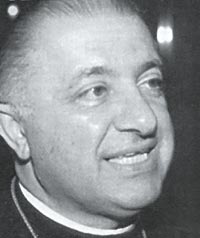 DIONIGI TETTAMANZI, born in Milan (1934). Small in appearance, more like Sicilian or south Italian than light-skinned north Italian. Said to be an excellent moral theologian, one of Pope John Paul II's major areas of expertise. Moral theology is an intensely topical and controversial field now. All conventional moral teaching is being called into question and many points never before challenged are explicitly called into question. Systematic treatments of ethical questions are of great importance in order to help priests make judgments in the confessional.
DIONIGI TETTAMANZI, born in Milan (1934). Small in appearance, more like Sicilian or south Italian than light-skinned north Italian. Said to be an excellent moral theologian, one of Pope John Paul II's major areas of expertise. Moral theology is an intensely topical and controversial field now. All conventional moral teaching is being called into question and many points never before challenged are explicitly called into question. Systematic treatments of ethical questions are of great importance in order to help priests make judgments in the confessional.
Ordained in 1957, after teaching moral theology most of his life and writing books, he was made Archbishop of Ancona in 1991. Highly popular with other Italian bishops, he was elected President of the Italian Bishops' Conference quite a few years ago, and predictions that he would some day be elected pope began to be heard. When a lot of bishops really like and trust you, when they feel you are the kind of man they want to represent them to the world and act as a fair judge in their quarrels with other bishops, you seem to have the main qualities a pope will need. As he was in the seminary with Giovanni Battista Re, and they seem to have stayed friends, it is thought that Re, as one of the two or three most powerful men in the next conclave, will back his old friend. Tettamanzi is criticized occasionally for weakness, caution, cowardice, a passion for being non-committal. When made a cardinal (1998), it appeared he was not confident, not very familiar with worldly people and their ways–certainly not at ease with the mob of well-wishers who suddenly found him important because he was a cardinal, nor the newspapers that said he might become pope.
The rumors that the next pope will come from Eastern Europe probably arise from the strong wish to see the liberals' favorite of the moment, Cardinal Vlk of Prague, become the pope.
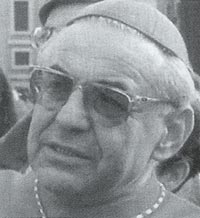 The name of MILOSLAV VLK has been mentioned in Rome and in other parts of Europe for at least five years. Ordained priest, aged 69. He is one of the few cardinals who never took the Anti-Modernist Oath (of Cardinal Ratzinger). He is a devotee of the Focolare Movement, a form of "spiritual renewal" that has some of the enthusiastic and cultish tones of Opus Dei, or the Communion and Liberation movements, but is much more emotional, much less interested in recruiting men in soft garments, but totally ecumenical nonetheless. He was ordained only after Vatican II had come and gone, and when "the spring of Prague" had come and gone, too, Vlk was a non-person once more and was obliged to function as an underground priest. Except for Schonborn, Vlk is the only well-known Eastern European.
The name of MILOSLAV VLK has been mentioned in Rome and in other parts of Europe for at least five years. Ordained priest, aged 69. He is one of the few cardinals who never took the Anti-Modernist Oath (of Cardinal Ratzinger). He is a devotee of the Focolare Movement, a form of "spiritual renewal" that has some of the enthusiastic and cultish tones of Opus Dei, or the Communion and Liberation movements, but is much more emotional, much less interested in recruiting men in soft garments, but totally ecumenical nonetheless. He was ordained only after Vatican II had come and gone, and when "the spring of Prague" had come and gone, too, Vlk was a non-person once more and was obliged to function as an underground priest. Except for Schonborn, Vlk is the only well-known Eastern European.
It might be interesting to interject here that I have heard journalists in Rome say the one thing the electing cardinals are not about to do is to choose a new pope right away who is Polish. The candidate will inevitably be compared to Pope John Paul II and look bad, or perhaps even negligible, alongside him. There is no obvious Polish candidate there anyway, and it is evident that the larger-than-life figure of Pope John Paul II could only make any other Polish pope look very small.
Some analysts say a lot of cardinals think John Paul II is only too likely to function after his death as a rival to his successor, whoever it may be, so that the cardinals will especially want to find a bishop who is so drastically different from John Paul that people will not think of comparing the two. A non-Italian successor, however, could not possibly be that drastically different from the first non-Italian pope in 450 years. The surprise, the excitement, the glamor, of a non-Italian pope turning up suddenly after those long centuries are unrepeatable, and cannot possibly be recaptured now by anyone, unless perhaps a Martian.
Yet one idea that finds support is that Pope John Paul himself would like a successor from the East of Europe, and this is possible, so long as he is not Polish. If he came from somewhere else, anywhere else, the direct and embarrassing comparison with this "super-Pope" need not hang over all that John Paul's successor might do or say. Does Vlk get the nod?
As an underground priest before the Iron Curtain really came down, he was a window cleaner. He wrote an autobiography titled The Window Cleaner about his experiences in those days. He is not very photogenic. Since Vlk is probably the most liberal cardinal in Eastern Europe and manifests a very fierce opposition to the Latin Mass, he is already elected in the minds of many.
He somehow satisfies the anti-Catholic feeling that is fairly strong in the liberal press of France, Germany or Holland, who were widely acclaimed as prophets 40 years ago, though less was heard about them as it became uncompromisingly clear that they were leading people to a radical rejection of the religion which they claimed to be reforming. Cardinal Danneels of Belgium and Murphy-O'Connor of Westminster, are eager to find and promote just such a man. (Cardinal Danneels is credited with circulating soft-core porno or even fairly hard-core porno in the guise of "sex education" in Belgium.)
At present Vlk has virtually replaced the left-wing star of years gone by, Carlo Cardinal Martini, of Milan, Italy, in the dream world of the professional newsmen who will control the reports from Rome. They now say openly what they once found too painful to admit, i.e., any cardinal who is openly liberal is not going to be elected. Martini is pretty open, and he does not live in some remote, exotic country, and he chatters and scribbles all the time. He is fearless. Besides, Martini is anyhow no longer young, or even middle-aged. He will turn 75 and will be expected to resign the Archdiocese of Milan quite soon.
He has written an amazing number of books, although nobody ever quotes a single sentence from any of them. Politically he would probably be a first-rate leader since his comments on the Kosovo War last year were among the most impressive of any figure in Europe–brilliant, shrewd, and heart-felt.
His being a Jesuit is not an asset. His unwillingness to raise his voice or lift a finger to remedy the glaring problems in his own order, and others, is not in his favor. Cardinals do not like to talk about the endless scandals but these things prey on their minds.
His evident contempt for almost everybody in the Curia seems likely to alienate a fair number of voters, and it would suggest that his election would trigger an explosion–a revolution–in the Vatican. But in view of his age it would now be a half-baked revolution.
Cardinal Martini's notorious sympathy with the idea of a married priesthood would bring him immediately into direct conflict with most of the Catholic bishops throughout the world, and give him a highly unpredictable and even dangerous group of supporters.
It is only quite recently that the international press, and especially the American press, stopped running articles at fairly regular intervals about the great hope to see Martini become pope.
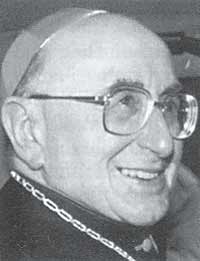 The conservative counterpart to Cardinal Martini, GIACOMO BIFFI, the Archbishop of Bologna, is someone else who would rather be right in his own eyes than be pope, and he will not even reply to the violent attacks on him which occasionally appear in the Italian papers. He has always been known as a sincere and intelligent man, but never, never, as a discreet one. He does not mince words. His favorite new movement is Communion and Liberation. It is an intellectual movement, and in the U.S. its earnest, sometimes badly-dressed adherents are supposed to be generally pretty neurotic, often in therapy. They can discuss ideas and issues of the day intelligently. At the same time it is supremely unfashionable, even anti-fashionable, and never politically correct.
The conservative counterpart to Cardinal Martini, GIACOMO BIFFI, the Archbishop of Bologna, is someone else who would rather be right in his own eyes than be pope, and he will not even reply to the violent attacks on him which occasionally appear in the Italian papers. He has always been known as a sincere and intelligent man, but never, never, as a discreet one. He does not mince words. His favorite new movement is Communion and Liberation. It is an intellectual movement, and in the U.S. its earnest, sometimes badly-dressed adherents are supposed to be generally pretty neurotic, often in therapy. They can discuss ideas and issues of the day intelligently. At the same time it is supremely unfashionable, even anti-fashionable, and never politically correct.
It said that a year or two ago Biffi gave a learned address based on a passage from one of the trendiest, wildest, and most spiritual of the Russian writers of 100 years ago. It was a meditation on the likely character of the anti-Christ. The passage he took up for comment was quite unfamiliar, and Biffi's remarks were widely reported as holding a mad belief that the anti-Christ was alive right now and was an important ecologist in the world of today. Biffi made no effort to correct inaccurate reports, apparently because he thinks of journalists as vermin, and because he would quite seriously rather not be mentioned favorably by them. He is always ready to spit right in their eye, and he takes for granted that they will do the same to him, and apparently thinks it simpler and healthier not to engage in pretenses.
People are convinced that he has no wish at all to become the pope and is even pleased to offend people in order to exclude himself. Is that part of a clever campaign to make himself look different from all other available cardinals, and so get the tiara after all?
If it is clever to look like you could certainly never be trusted to make some kind of prudent compromise with anybody or anywhere, then he is very clever. But many people do find his remarks refreshing. For one thing, they believe he really means what he says. There seems no point in saying what he does, except that he believes it, and that he thinks it wrong and degrading to flatter the pope, or the press, or the theologians, or the Americans, or the voters, or anybody.
People do seem to be tired, not to say exhausted, from the excessive praise Pope John Paul II has meted out in recent years, and Biffi, more than most cardinals, perhaps more than any other, has hinted plainly that John Paul has left a good deal to be desired and made gestures–such as the apology framed to please the Jews so the Pope could gain himself entry into Israel–that inexcusably scandalized people. Undoubtedly, certain men in the Vatican, even certain cardinals who were forced to appear on a stage with the Pope to make the apology, agree.
At 72, Biffi is also just about the "right age," according to prevailing political wisdom. He is the leading opponent in the Church of Moslem immigration into Italy. He might conceivably function better than anyone else in relation to the right-wing Berlusconi government in Italy, which is not improbably coming in the near future, though it is rash to say that Biffi would be likely to get along with anyone. But quite a lot of his ideas are sensible and popular, though hated by the Italian press. And under the influence of a more right-wing government in the US, the Italian press might very well change.
With the exception that follows, Biffi might be the most popular with the Catholics of Italy of all the present cardinals.
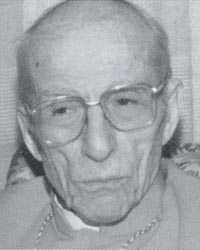 ERSILIO TONINI is the one and only cardinal who is hugely popular in Italy with normal people who like to watch television, and he is a cardinal precisely for that reason and no other. He is 86 years old.
ERSILIO TONINI is the one and only cardinal who is hugely popular in Italy with normal people who like to watch television, and he is a cardinal precisely for that reason and no other. He is 86 years old.
For some reason his words are always simple, clear, entirely unexpected and illuminating. Some people just have that gift. He is not at all aggressive, he is not in the least apologetic, he is not mean-spirited, he is not sugary, he is not long-winded, he is not left-wing. He has spent his life learning how to speak persuasively to the man in the street.
He was vice-rector of a seminary at the age of 25, later a rector, and after a career which involved, I think, a lot of religious journalism, was made Archbishop of Ravenna at the age of 61. At 75 he resigned the archdiocese, but being still quite lively, energetic, and full of zeal, he went onto television to explain the Church's position on all kinds of things to viewers of the tube. For some reason he became a major "star." At least everybody loved him–it is easy to understand him and hard to quarrel with the way he puts things–and he developed a significant following which very few of the hundreds of other TV preachers in Italy could rival. He always seems to speak as an individual, yet he seems somehow correct and official without provoking resentment. When the Pope heard about his celebrity status, he made the 80-year-old man a cardinal. Because he is passed 80 years, Tonini can't even vote for the next pope. But he continues to be the voice of the Church, perhaps more than the Pope himself, who after all cannot think like an Italian and must always be utterly correct. Tonini's expertise was shown most recently on the occasion of the suicide of the heir of the unofficial royal family of Italy, the Agnellis. He said exactly the right thing, in an impossible situation; not a word too much or too little. But he always does. Practice makes perfect.
It would take a little imagination for the cardinals to elect Tonini. I don't think they will do it. It would not be at all strange, though, if they asked his opinion and listened to it carefully.
It is probable that the next papal conclave will be a dramatic one. A duel seems possible, or inevitable, between Cardinal Ratzinger and Archbishop (but future Cardinal) Giovanni Battista Re: two prelates who are said to hold opposing opinions about the Tridentine Mass and about the liturgy generally, who are by far the strongest personalities expected to take part in the conclave, and who will sway the most voters.
According to the papal profile shaping up in the Curia in anticipation of the conclave, it is going to matter a lot if there are one or two talented, experienced, and agreeable Italian cardinal-archbishops under 70 in northern Italy (behind whom Cardinal Ratzinger will most probably stand) who might be able to match up against Archbishop Re's old friend, Cardinal Tettamanzi, Archbishop of Genoa, who will inevitably have the strengths (and weaknesses) of appearing to be Archbishop Re's candidate in the next election.
At present it looks like there is going to be no plausible alternative to Tettamanzi between now and 2004, i.e., no plausible alternative, possibly, to a situation in which, whoever may reign, the same person will continue to rule-Archbishop Giovanni Battista Re.
One cannot but wonder if Cardinal Ratzinger will fail to notice this odd situation, which might strike him, and might strike a few other people too, as less than satisfactory. In view of the new plan to allow only half of the voters to determine the papal election, instead of two-thirds of them, as in the past elections, a clear split could be quite extraordinarily dangerous, and the Church could within a couple of years have its own Florida impasse as the U.S. just did with its presidential election. And the Church does not have a Supreme Court to deal with such problems.
